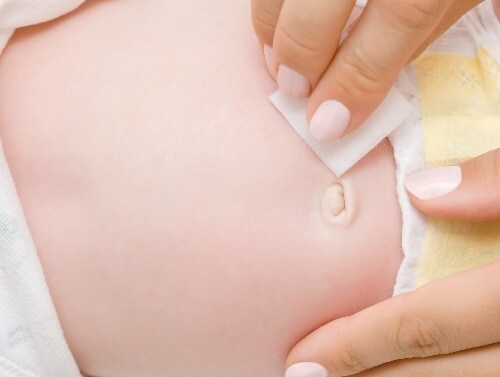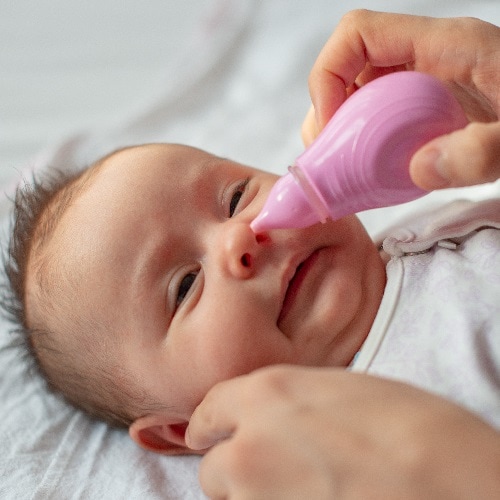Tips for New Parents
New parents get the joys of experiencing first smiles, first steps and all the little firsts in between for their baby. Each day with a newborn is a new adventure with lots of questions – especially for first time parents.
North Knoxville Pediatrics has helped countless newborns and first time families gain confidence with their short list of tips to care for newborns.
Sleep
 A safe sleeping environment is one of the most important things you can provide to keep your baby safe. Since your infant will be sleeping close to 17 hours a day, make sure their environment is perfect for counting sheep.
A safe sleeping environment is one of the most important things you can provide to keep your baby safe. Since your infant will be sleeping close to 17 hours a day, make sure their environment is perfect for counting sheep.
- Infants should sleep alone on a flat, firm surface such as in a bassinet or crib in the parents’ room
- Babies should sleep on their backs wearing only their clothes or a wearable blanket, and they only need one additional layer to avoid overheating
- Do not put anything in the bed with baby (e.g. avoid blankets, bumpers, or stuffed animals)
- Sound machines offer a variety of sound options and are crucial for fussy periods or to incorporate as part of bedtime
Feeding
 Every baby is unique, and you and your baby will learn more about each other every day. If you have questions about your baby’s feeding, please consult your pediatrician.
Every baby is unique, and you and your baby will learn more about each other every day. If you have questions about your baby’s feeding, please consult your pediatrician.
- In the first 1-2 weeks of life, formula-fed babies eat about 1-2 ounces (30-60 milliliters) at each feed, every 2-3 hours
- By one month of age formula-fed babies often take 3-4 ounces (90-120 milliliters) every 3-4 hours
- Breastfed babies usually feed slightly more often, every 2-3 hours
- In the first few weeks, babies sleeping more than 4-5 hours should be woken up and offered a feed
Potty Time
 Babies are great at keeping new parents up at night, but don’t let their bathroom habits keep you awake. Babies’ bathroom habits vary significantly, and newborns and young infants often strain and cry when passing gas or stool.
Babies are great at keeping new parents up at night, but don’t let their bathroom habits keep you awake. Babies’ bathroom habits vary significantly, and newborns and young infants often strain and cry when passing gas or stool.
- First bowel movements are often sticky and dark
- Feeding introduces bacteria into the gut which turns stools from black to green to yellow in color
- Breastfed babies often have watery stools with seedy bits and will stool a little with each feed or sometimes only once a week due to high absorption of breast milk
- Formula-fed babies have pastier stool that varies widely in color, and they often stool once a day
Belly buttons
 Umbilical cord stumps usually fall off in the first three weeks.
Umbilical cord stumps usually fall off in the first three weeks.
- Keep the area clean and dry
- If soiling occurs, use a cotton-tipped applicator dipped in rubbing alcohol to clean the area
- Once the cord detaches, there is normally yellowish goo underneath that is newly forming skin and can take up two weeks to completely heal
Crying
 Do you feel like your baby is always crying? Babies cry between 1-4 hours daily to communicate emotions like hunger, pain, cold, frustration and more. Sometimes, babies even cry for no reason at all.
Do you feel like your baby is always crying? Babies cry between 1-4 hours daily to communicate emotions like hunger, pain, cold, frustration and more. Sometimes, babies even cry for no reason at all.
- You will learn the various cries of your baby
- Pacifiers, swaddling, cuddling, walking with baby in your arms, pushing them in a stroller, playing music or white noise, rocking in a chair, or stroking or patting their bottom can soothe baby
- If you need a break from baby’s cries, leave them in a safe location like a crib or pack n play. Baby monitors are helpful for moments when baby is resting in another room or when you need a break from a fussy infant; they come with sound only or sound and video to best suit your needs
- Remain calm and take a break, or ask for help from a trusted friend or family member when you need it
Skin
 Babies experience many types of rashes in the newborn period.
Babies experience many types of rashes in the newborn period.
- The skin commonly peels as babies transition from the womb (a wet environment) to the dry outside world
- Use only sponge bathing until the umbilical cord falls off
- If redness appears in the diaper area, use a gentle diaper cream with zinc oxide or petroleum jelly at each diaper change
- Ask your doctor at the newborn visit about any spots, peeling, redness, “birth marks,” or any other concern
Breathing
 Newborns and young infants are nose breathers, meaning they do not breathe out of their mouths for the first several months of life.
Newborns and young infants are nose breathers, meaning they do not breathe out of their mouths for the first several months of life.
- Because of nose breathing, babies often make cute and sometimes alarming noises during sleep and feeds
- Nasal suction with or without saline drops can help clear mucus and relieve noisy breathing
- Your baby breathes a lot faster than you, so their breathing may sound rapid at times
- You may notice periodic breathing which means your baby’s breathing rate can vary from short pauses of a few seconds to breathing up to 80 times a minute in just a few seconds
- Periodic breathing is normal and is due to an immature brain stem; it resolves in a couple of months
Development
 Newborns grow and change every day. These are general guidelines, but your pediatrician will help you track growth and development of your little one.
Newborns grow and change every day. These are general guidelines, but your pediatrician will help you track growth and development of your little one.
- Newborns can only see 8-12 inches away; look in their faces when you hold them and provide high-contrast (think black and white patterned) toys or books to help them develop vision
- Babies will often know the sounds of their main caregiver’s voice and enjoy being talked or sung to
- If you notice your baby moving their head side to side when on your chest, this is a precursor to lifting their heads during tummy time
- Soft, gentle touch and sensations are enjoyable to babies
- You can gently move and massage the upper and lower limbs to help baby adjust to being outside the womb
- Phone apps can allow you to track feeds, diapers, sleep, weight changes, and developmental milestones
When to Call the Doctor
 Pediatricians play a crucial role in a child’s health and wellbeing. When you have a question, they are the best resource for advice and discussion. While most of the topics above can be discussed at a well visit, contact your pediatrician immediately if your baby is experiencing any of the following.
Pediatricians play a crucial role in a child’s health and wellbeing. When you have a question, they are the best resource for advice and discussion. While most of the topics above can be discussed at a well visit, contact your pediatrician immediately if your baby is experiencing any of the following.
- Not consistently waking to feed
- Working hard to breathe or persistently breathing fast
- Choking with feeds or vomiting with each feed
- No urine for 6-8 hours
- Rectal temperature of 100.4 or higher
- Yellow skin, especially if worsening since hospital discharge
- Persistent crying despite using the above measures to soothe
- A new or unusual rash
- Frequent, large, watery, bloody, or white stools